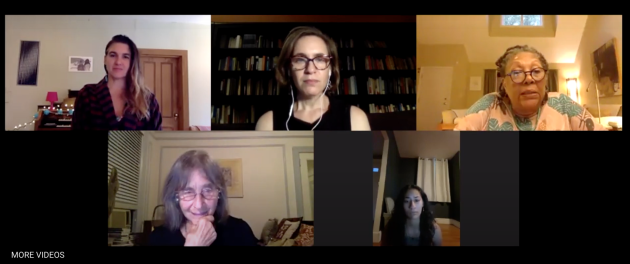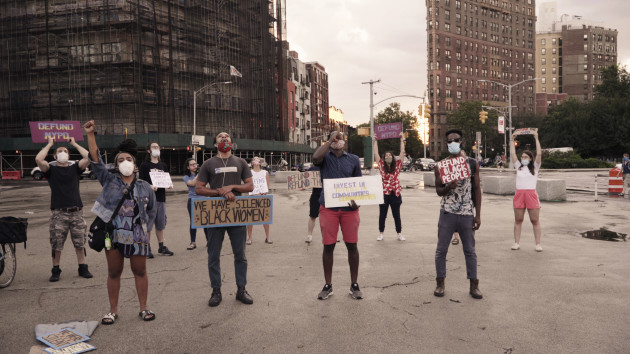The Lilith Blog
August 10, 2020 by Elana Rebitzer
Countering Isolation with Poetry
Over the last few months, I have found myself attending fewer and fewer of the Zoom live-streamed events that keep popping up on my Facebook page. What at first seemed like an exciting way to connect to new and old faces in the age of social distancing has started to feel like more of a chore, a less-than-pleasant activity to be avoided whenever possible. Time and time again, I exit these Zoom events feeling even more isolated than before.

“Poetry in Times of Peril,” presented by Hebrew College-Interfaith Youth Core PsalmSeason project, with co-sponsors Jewish Women’s Archive and Lilith magazine, could have added to that feeling of isolation. Instead, it addressed those feelings of isolation head-on, and as a result, actually left me feeling more connected to the rest of the world.
- No Comments
August 5, 2020 by Yona Zeldis McDonough
Nostalgia for the 1939 World’s Fair
Neither Maxine Roth nor Vivi Holden wanted to be sent to World’s Fair in the spring of 1939; Max was angling for a journalism internship at the New York Times and Vivi was excited by a starring role—her first—in the Hollywood film Every Last Sunset. But both young women do end up at the fair. What they learn—about themselves, the nature of friendship and indeed life—are the basis for the novel We Came Here to Shine (St. Martin’s, $16.99). Fiction Editor Yona Zeldis McDonough chats with author Susie Orman Schnall about her entertaining new summer read—think of it as a perfect respite from the horror of the daily news. (more…)
- No Comments
August 4, 2020 by admin
Discussing the Holocaust… at Comic-Con
The Holocaust might not be the first thing that comes to mind when you think of Comic-Con—the annual international convention that usually takes place in San Diego, California, and that spotlights comic books and related popular arts. But as Stephen D. Smith, Executive Director of the USC Shoah Foundation, explained when he recently introduced the panel, “Art and the Holocaust,” as part of this year’s Comic-Con@home programming: “One of the things that I have noticed over the years is just how many witnesses of the Holocaust have turned their experience not only to testimony in words but also in art.”
- No Comments
July 31, 2020 by Yona Zeldis McDonough
Is Rape a Crime? A Conversation with Michelle Bowdler
Is Rape a Crime: A Memoir, an Investigation and a Manifesto (Flatiron, $27.99) ought to come with a warning: parts of this book are so harrowing that I frequently had to put it down for a spell before picking it up again, avid to continue. Long after the fact, author Michelle Bowdler returns to the home invasion and brutal rape she suffered as a young woman. As one might expect, the attack both branded and shaped her. When she was finally ready to explore the subject in print, she was able to go deep into her own experience but also wide, to place it within a historical and cultural context. Bowdler talks to Fiction Editor Yona Zeldis McDonough about what this literary exploration has meant for her—and what she hopes it will mean to others.
- No Comments
July 30, 2020 by Arielle Silver-Willner
Twinkle Times Two: On Vigilance and Anxiety
“Take your shoes off,” I remind my mother. “Drop your keys; I’ll clean them.” “Wash your hands and get changed. Wait, no—take off your street clothes first, then wash your hands. But don’t touch anything else.” She comes inside. I cringe as she sets her sunglasses down on the kitchen counter, making a mental note to sanitize them when she isn’t looking, and give the counter a scrub too, of course. I follow her to her bedroom, watching her undress, confirming that her shorts and t-shirt make it into the laundry bag.
Will it be enough? Is it too much?
- No Comments
July 30, 2020 by admin
Why My Hair Falls the Way it Does
When I was 11 years old, my father sat me down on a broken, four-legged stool that had been in our apartment for years. Facing me, he began to hum the tune of a Tracy Chapman song. As I sat staring at him, I noticed his long dreads and the scar he had from when he was a boy in Jamaica. I prayed the song would never end.
- No Comments
July 29, 2020 by admin
AOC, Ted Yoho and The Origin of Vulgarity
Last Monday, Republican Rep.Ted Yoho, from the steps of the Capitol, called Rep. Alexandria Ocasio-Cortez disgusting, crazy, dangerous, and a “fucking bitch” insulting and harassing her in front of colleagues and reporters. On Wednesday, Yoho offered a non-apology on the House floor, stating that despite regretting his “abrupt” manner of conversation, he could not apologize for his passion. He couldn’t apologize for being a God-loving patriot and “family man,” using the all-too-common tactic of deploying his daughters and wife as shields for his misogynistic behavior.
- No Comments
July 28, 2020 by admin
Why We’re Doing Public Teshuvah to Fight White Supremacy

Photo by Hannah Roodman
Heading to Grand Army Plaza at 7:20 pm. Seeing a group start to gather, forming a circle. Picking up the protest sign that speaks to me from the middle of the circle. Finding a place in the circle to stand and hold up the sign. Stepping into the center to share what aspect of systemic racism I am mourning that day. Or, stepping into the circle to confess how I myself have participated in and perpetuated racism and anti-Blackness. Actively listening. Turning my body East at 8:00 pm. Blowing the shofar for one long breath. Hearing those around me cry out to the Heavens. Standing silently for a moment. Turning back to face the circle. Stepping into the circle again, this time to share a specific way that I will be actively anti-racist moving forward —my commitment to this community. Actively listening. Putting the protest sign back in the middle of the circle. Saying hello to friends and community members. Returning home.
- No Comments
July 27, 2020 by admin
Get Your Chill On
The first cold soup I ever tasted I hated. For years.
How unfortunate that it was introduced to me (dare I say pushed on me?) by the two women I admired most, my mother and my small-but-mighty Russian grandmother. Imagine walking seven long blocks home from elementary school for a tasty lunch, only to be met by a bowl of beet borscht from a jar. Yes, jarred! Two women who made from scratch the hit parade of Ashkenazic food– chicken soup, brisket, tongue, sweetbreads, both potato and noodle kugels, even gefilte fish– loved their industrial borscht, adding sour cream to complete the dish. I gagged trying to get it down, rarely succeeding.
- No Comments
July 16, 2020 by Sharrona Pearl
“Better Things:” Your Jewish and Frankly Feminist Review
Better Things reached season 4 and protagonist Sam’s kids are still assholes: the formerly angelic Duke a little bit more, the always caustic Frankie a little bit less, and we barely see lovely wild child Max anymore. Time, in the world of this funny, melancholic, and moving show about raising three daughters as a divorced single mom in LA, is progressing. And Sam – played by director and creator Pamela Adlon, herself, like Sam, a single divorced mother with a Jewish father – is moving on too. This season is all about movement: in the water that forms the backdrop to every episode in one way or another; in the lingering camera shots that dwell on paintings, or facial expressions, in an expected black and white silent movies; and in the interviews of women that dwell lovingly and joyfully and painfully on their words as if to insist that these words matter.
- No Comments
 Please wait...
Please wait...